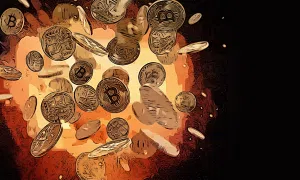Valerii Babushkin has been in the crypto industry since 2017. But he took a break to work at Facebook, where he got bored, and in 2021 he made a spectacular comeback, starting to work at Blockchain.com. Here he does Data Science.
Why did I decide to interview him for buidlbee? Trading and Data Science are actually quite similar professions. Which is ironic because Valerii himself doesn’t do trading. And he’s ready to dispel all your misconceptions about this process.

How Data Science is connected with blockchain and crypto
“I don’t like the term Data Science,” Valerii begins. “It mixes up too many definitions. But in terms of what my team does, yes, we work with data.” He goes on to list many highly specialized terms: data quality, data lake, data warehouse, etc. I ask what this means in simple terms.
“I would say that we are trying to answer the questions ‘what happened?’, ‘why?’ and ‘what consequences could this have?’” explains Valerii.
The brand new newsletter with insights, market analysis and daily opportunities.
Let’s grow together!
I really want to know how this happens in blockchain, but I’m in for a disappointment: it turns out that Data Science in the crypto industry has no specifics. And it doesn’t work the other way around either, by the way: Data Science is one of those domains where blockchain disrupts everything; it doesn’t affect existing methods and approaches. But there are peculiarities: goals and data.
And this is where we get to the fun part. After all, effective trading is also tied to data.
“Successful speculation is mainly handled by organizations, not people”
I don’t like to beat around the bush, so I just ask Valerii how data can help make money. “What’s the goal: to speculate or invest?” he parries. “The goal is to make money,” I smile.
Valerii seems amused by my question:
“The easiest way to make money is to buy Bitcoin and forget about it for ten years. Not the worst strategy, at least it was like that — those who did it ten years ago are hardly complaining now.”
So it is, but, as Valerii himself agrees, what will happen in the future — no one knows. So we’re back to speculation. My interviewee is skeptical about trying to make money from them.
“Successful speculation is mainly handled by organizations, not people. Because you have to collect and process signals, you need infrastructure and resources for that,” he says. “Any effective trading is based on math and data analytics. If you figure them out and are able to fight for milli or nanoseconds, it’ll work. And if you do not figure it out, you’re more likely to get made. But that’s okay; that’s how the market works: someone has to lose.”
Crypto is a casino: but there’s a chance to stop betting blind
I ask Valerii if that means “abandon all hope, ye who enter here.”
“Well, why not,” he reassures me. “You can make money in a casino, and this is a casino, too. It’s just that when you catch a wave, you shouldn’t think it’s because you’re a genius trader.”
He adds that if one wants to go into speculation like a casino, there’s nothing wrong with that, but one will have to be prepared to lose. To stress, this applies to speculation, e.g. quickly buying and selling assets in a desire to make money on the difference.
So what should do those don’t want to bet at random but have a desire to understand what they’re doing, at least a little bit? Unfortunately, there are no simple answers.
But here are some tips from Valerii:
- Read books: on mathematics, statistics, and calculus. “It’s serious learning, yes, but there’s no book that you can pick up, read, and understand all at once.”
- Try your hand at a test environment. “There’s a platform called Kaggle where periodically trading companies put up competitions. Try your hand at it. If you end up in the top 100, you can extrapolate that to the crypto world.”
- Go to a trading office. “Trading is a full-time job. And being a solo trader makes no sense — you won’t make much. You have to work in a team.”






